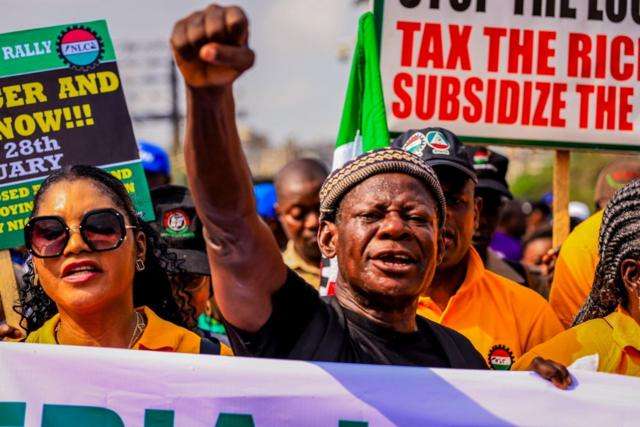The Nigeria Labour Congress (NLC) has taken to the streets across the country in a series of nationwide protests. The demonstrations aim to draw attention to the severe economic challenges faced by citizens and demand immediate action from the government.
In the capital city, Abuja, protesters have gathered in large numbers, brandishing placards with powerful messages such as #End Poverty and Hunger, #Support Local Industries; #Fix Local Refineries, #End Subsidy; #End Naira Devaluation; #Tax the Rich Subsidise the poor, among others.
The NLC is calling for urgent measures to address rising inflation, insecurity, and the exorbitant cost of essential goods and services.
Workers led by Joe Ajaero, President of the Nigeria Labour Congress, staged a protest at the National Assembly on February 27, 2024, presenting their list of demands.
The letter was received by Senator Diket Plang, Chairman of the Senate Committee on Labour, Employment, and Productivity.
The demands included full implementation of welfare provisions, job creation, immediate subsidies for farmers to enhance agricultural output, and repairing the country’s four refineries. Ajaero emphasized the necessity of peaceful protest due to widespread hunger.
In response, Plang assured the protesters that the National Assembly would promptly address their demands without delay.
In Benin City, Edo State, Union members from various organizations, including NLC, Nigeria Union of Teachers (NUT), and the National Union of Road Transport Workers (NURTW), also gathered at the National Museum ground in Benin City. Their unified message: “We demand solutions!”
How Bad Is The Economy?

Overall, annual inflation, which is the average rate at which prices go up, is now close to 30% – the highest figure in nearly three decades. The cost of food has risen even more – by 35%.
However, the monthly minimum wage, set by the government and which all employers are supposed to observe, has not changed since 2019, when it was put at 30,000 naira – this is worth just $19 at current exchange rates.
Many are going hungry, rationing what food they have, or looking for cheaper alternatives.
In the north, some people are now eating the rice that is normally discarded as part of the milling process. The waste product usually goes into fish food.
Widely shared social media videos indicate how some are reducing portion sizes.
One clip shows a woman cutting a fish into nine pieces rather than the average four to five. She is heard saying her goal is to ensure her family can at least eat some fish twice a week.
Inflation has soared in Nigeria as a result of decades of poor economic management.
However, President Tinubu’s efforts to reshape the economy have introduced additional challenges.
Upon taking office nine months ago, the president declared the discontinuation of the long-standing fuel subsidy.
While this subsidy had kept petrol prices low for citizens in this oil-producing nation, it had become a substantial financial burden, accounting for 15% of the budget in the first half of 2023—surpassing expenditures on health and education combined.
President Tinubu argued that these funds could be more effectively allocated elsewhere.
Nevertheless, the subsequent significant increase in petrol prices has led to a ripple effect, causing other prices to escalate as companies transfer higher transportation and energy costs to consumers.
Another contributing factor to the rising inflation is an issue inherited by Mr. Tinubu from his predecessor, Muhammadu Buhari, as highlighted by financial analyst Tilewa Adebajo.
He said that the previous government had asked the country’s central bank for short-term loans to cover spending amounting to $19bn.
The bank printed the money, which helped fuel inflation, Mr Adebajo said.
Mr. Tinubu also discontinued the policy of pegging the price of the Nigerian currency, the naira, to the US dollar, opting instead to allow the market to determine its value based on supply and demand.
The central bank had been expending considerable resources to maintain this fixed rate.
However, the removal of the peg resulted in a significant depreciation of the naira’s value, dropping by more than two-thirds and briefly reaching an all-time low recently.
For instance, whereas last May 2023, 10,000 naira could purchase $22, now it can only buy around $6.40. As the naira is worth less, the price of all imported products has gone up.




















